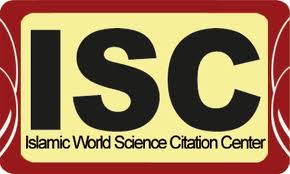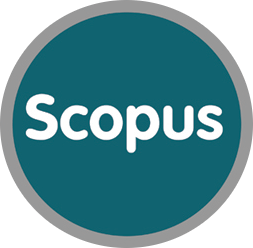SYMBOL LEVEL DECODING FOR DUO-BINARY TURBO CODES
DOI:
https://doi.org/10.31436/iiumej.v18i1.661Abstract
This paper investigates the performance of three different symbol level decoding algorithms for Duo-Binary Turbo codes. Explicit details of the computations involved in the three decoding techniques, and a computational complexity analysis are given. Simulation results with different couple lengths, code-rates, and QPSK modulation reveal that the symbol level decoding with bit-level information outperforms the symbol level decoding by 0.1 dB on average in the error floor region. Moreover, a complexity analysis reveals that symbol level decoding with bit-level information reduces the decoding complexity by 19.6 % in terms of the total number of computations required for each half-iteration as compared to symbol level decoding.Downloads
Download data is not yet available.
Metrics
Metrics Loading ...
References
[1] Berrou C, Glavieux A, Thitimajshima P. (1993) Near Shannon limit error-correcting coding and decoding: Turbo-codes. IEEE Iinternational Conference on Communications, ICC 93, Geneva.
[2] Shannon C E. (1948) A mathematical theory of communications, part I. Bell System Technical Journal, 27:379-423.
[3] Berrou C, Jézéquel M. (1999) Non Binary Convolutional Codes for Turbo Coding. IEEE Electronic Letters, 35(1):39-40.
[4] Berrou C, Douillard C, Jézéquel M. (1999) Multiple Parallel Concatenation of Circular Recursive Convolutional (CRSC) codes. Annals of Telecommunications, 54(3-4):166-172.
[5] Giancristofaro D, Bartolazzi A. (2001) Novel DVB-RCS standard turbo codes: details and performance of a decoding algorithm. Seventh International Workshop in Digital Signal Processing Techniques for Space Communications.
[6] Soleymani M R, Gao Y, Vilaipornsawai U. (2002) Turbo Coding for Satellite and Wireless Communications. Kluwer Academic Publishers, New York.
[7] Soleymani M R, Gao Y. (2002) Spectrally efficient non-binary turbo codes: Beyond DVB-RCS standard. Proceedings of 21st Biennial Symposium on Communications, 3:951-955.
[8] Kalama M, Acar G, Evans B, Isoard A. VoIP over DVB-RCS Satellite Systems: Trial Results and the Impact of Adaptive Speech Coding using Cross-Layer Design. International journal of Computer and Telecommunications Networking, 52(13):2461-2742.
[9] Berrou C, Jezequel M, Douillard C, Kerouedan S. (2001) The advantages of non-binary turbo codes. Information Theory Workshop, IEEE proc.
[10] Balta H, Alexa F, Vesa A. (2014) On the allocation of double-binary turbo coded bits in the case of 16-QAM modulation. 11th International Symposium on Electronics, Timisoara.
[11] Shaker S W. (2014) DVB-RCS: Efficiently quantized turbo decoder. 16th International Conference on Advanced Communication Technology (ICACT), Pyeongchang.
[12] Zhan M, Zhou L, Wu J. (2014) A low-memory intensive decoding architecture for double-binary convolutional turbo code. Turkish Journal of Electrical Engineering & Computer Sciences, pp. 202-213.
[13] Zheng J Y, Li L, Zhu Y S., (2015) The Performance of Double-Binary Turbo Codes in the HAP-Based Communication System. Applied Mechanics and Materials, 713-715:1141-1144.
[14] Balta H, Lucaciu R, Gajtzki P, Isar A. (2012) QPP Interleaver based on Turbo Code for DVB-RCS Standard. 4th International Conference on Computer Modeling, Singapore.
[15] Park T, Kim M, Kim C, Jung J. (2010) Analysis of Turbo codes for Next Generation DVB-RCS system. 28th American Institute of Aeronautics and Astronautics International Communications Satellite Systems Conference (ICSSC), Anaheim, California.
[16] Vucetic B, Yuan J. (2000) Turbo Codes: Principles and Applications. Kluwer Academic Publishers.
[17] Gao Y, Soleymani M R. (2002) Triple binary circular recursive systematic convolutional turbo codes. IEEE, pp. 1.
[18] Gao Y, Soleymani M R. (2002) Spectrally efficient non-binary turbo codes: Beyond DVB-RCS standard. Proceedings of 21st Biennial Symposium on Communications, 3:951-955.
[19] Fowdur T P, Beni Y. (2012) Reliable JPEG image transmission using unequal error protection with modified non-binary turbo codes. IARIA, 5:284-296.
[20] Mouhamedou Y O C. (2005) [Online]. Available: http://www-mmsp.ece.mcgill.ca/MMSP/Theses/2005/Ould-Cheikh-MouhamedouT2005.pdf. [Zugriff am December 2012].
[21] Balta H, Kovaci M, Botiz C, Poenaru C. (2009) Bit Decoding versus Symbol Decoding in Multi-Binary Turbo Decoders. 4th International Conference of Engineering Technologies, ICET 2009, Novi, Sad.
[2] Shannon C E. (1948) A mathematical theory of communications, part I. Bell System Technical Journal, 27:379-423.
[3] Berrou C, Jézéquel M. (1999) Non Binary Convolutional Codes for Turbo Coding. IEEE Electronic Letters, 35(1):39-40.
[4] Berrou C, Douillard C, Jézéquel M. (1999) Multiple Parallel Concatenation of Circular Recursive Convolutional (CRSC) codes. Annals of Telecommunications, 54(3-4):166-172.
[5] Giancristofaro D, Bartolazzi A. (2001) Novel DVB-RCS standard turbo codes: details and performance of a decoding algorithm. Seventh International Workshop in Digital Signal Processing Techniques for Space Communications.
[6] Soleymani M R, Gao Y, Vilaipornsawai U. (2002) Turbo Coding for Satellite and Wireless Communications. Kluwer Academic Publishers, New York.
[7] Soleymani M R, Gao Y. (2002) Spectrally efficient non-binary turbo codes: Beyond DVB-RCS standard. Proceedings of 21st Biennial Symposium on Communications, 3:951-955.
[8] Kalama M, Acar G, Evans B, Isoard A. VoIP over DVB-RCS Satellite Systems: Trial Results and the Impact of Adaptive Speech Coding using Cross-Layer Design. International journal of Computer and Telecommunications Networking, 52(13):2461-2742.
[9] Berrou C, Jezequel M, Douillard C, Kerouedan S. (2001) The advantages of non-binary turbo codes. Information Theory Workshop, IEEE proc.
[10] Balta H, Alexa F, Vesa A. (2014) On the allocation of double-binary turbo coded bits in the case of 16-QAM modulation. 11th International Symposium on Electronics, Timisoara.
[11] Shaker S W. (2014) DVB-RCS: Efficiently quantized turbo decoder. 16th International Conference on Advanced Communication Technology (ICACT), Pyeongchang.
[12] Zhan M, Zhou L, Wu J. (2014) A low-memory intensive decoding architecture for double-binary convolutional turbo code. Turkish Journal of Electrical Engineering & Computer Sciences, pp. 202-213.
[13] Zheng J Y, Li L, Zhu Y S., (2015) The Performance of Double-Binary Turbo Codes in the HAP-Based Communication System. Applied Mechanics and Materials, 713-715:1141-1144.
[14] Balta H, Lucaciu R, Gajtzki P, Isar A. (2012) QPP Interleaver based on Turbo Code for DVB-RCS Standard. 4th International Conference on Computer Modeling, Singapore.
[15] Park T, Kim M, Kim C, Jung J. (2010) Analysis of Turbo codes for Next Generation DVB-RCS system. 28th American Institute of Aeronautics and Astronautics International Communications Satellite Systems Conference (ICSSC), Anaheim, California.
[16] Vucetic B, Yuan J. (2000) Turbo Codes: Principles and Applications. Kluwer Academic Publishers.
[17] Gao Y, Soleymani M R. (2002) Triple binary circular recursive systematic convolutional turbo codes. IEEE, pp. 1.
[18] Gao Y, Soleymani M R. (2002) Spectrally efficient non-binary turbo codes: Beyond DVB-RCS standard. Proceedings of 21st Biennial Symposium on Communications, 3:951-955.
[19] Fowdur T P, Beni Y. (2012) Reliable JPEG image transmission using unequal error protection with modified non-binary turbo codes. IARIA, 5:284-296.
[20] Mouhamedou Y O C. (2005) [Online]. Available: http://www-mmsp.ece.mcgill.ca/MMSP/Theses/2005/Ould-Cheikh-MouhamedouT2005.pdf. [Zugriff am December 2012].
[21] Balta H, Kovaci M, Botiz C, Poenaru C. (2009) Bit Decoding versus Symbol Decoding in Multi-Binary Turbo Decoders. 4th International Conference of Engineering Technologies, ICET 2009, Novi, Sad.
Downloads
Additional Files
Published
2017-05-30
How to Cite
Beeharry, Y., Fowdur, T. P., & Soyjaudah, K. M. S. (2017). SYMBOL LEVEL DECODING FOR DUO-BINARY TURBO CODES. IIUM Engineering Journal, 18(1), 111–131. https://doi.org/10.31436/iiumej.v18i1.661
Issue
Section
Electrical, Computer and Communications Engineering






















